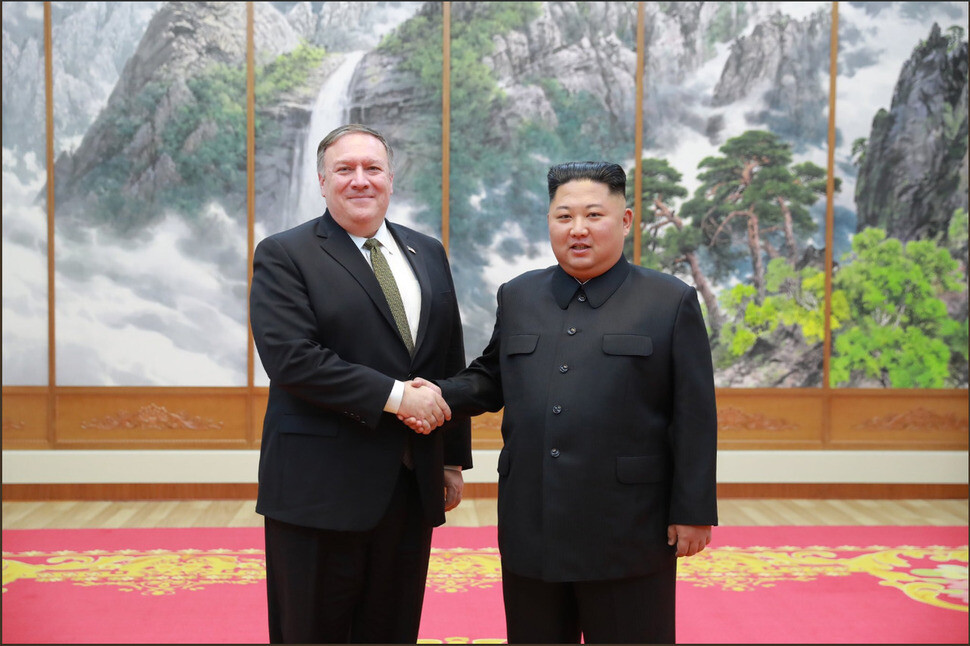hankyoreh
Links to other country sites 다른 나라 사이트 링크
North Korea’s demands shifting from end-of-war declaration to easing of UN sanctions

The focus of the “corresponding measures” that North Korea is publicly demanding from the US in exchange for its denuclearization is rapidly shifting from a formal declaration of the end of the Korean War to the issue of sanctions.
This change has been noticeable since US Secretary of State Mike Pompeo’s fourth visit to North Korea on Oct. 7. Some analysts think this is because the two sides came to an understanding about the end-of-war declaration during Pompeo’s meeting in Pyongyang with North Korean leader Kim Jong-un.
This focus is thought to represent North Korea’s intense desire for easing sanctions to be one of the major items on the negotiating table along with the end-of-war declaration in the run-up to the meeting between North Korean Vice Foreign Minister Choe Son-hui and US State Department Special Representative for North Korean Policy Stephen Biegun, which will function as “working-level talks” prior to the second North Korea-US summit.
The US’ plans to maintain and even strengthen sanctions came under fire in a column signed by a private individual titled “What can we learn from the nasty things being said in the US?” published by North Korea’s state-run Korean Central News Agency (KCNA), which is doctored for external consumption, on Oct. 16. “Considering how much time has passed since we stopped our nuclear tests and suspended our ICBM launches, it is only right for the sanctions to disappear accordingly, considering that they were concocted on the pretext of those actions,” the column said.
“It’s customary to give back as much as you take, but the US keeps taking without giving anything in return. This could cause the US to be criticized around the world for ‘swallowing the chicken whole without burping even once [trying to have its cake and eat it too].’” In this column, which ran for about 1,500 words, the word “sanctions” appeared 17 times, but the phrase “end-of-war declaration” did not appear even once.
Ever since North Korea publicly mentioned the end-of-war declaration in a statement by the spokesperson of its Foreign Ministry on July 7 in connection with Pompeo’s third visit to North Korea on July 6 and 7, it has repeatedly brought up this issue as a prime example of the corresponding measures it wants from the US.
The first time that a high-ranking North Korean publicly and officially mentioned the word “sanctions” after the North Korea-US summit on June 12 was during the keynote address to the UN General Assembly by North Korean Foreign Minister Ri Yong-ho on Sept. 29, in which Ri said, “The problem is that the sanctions are aggravating our distrust.” But even after that, the North Koreans had strongly pushed the issue of an end-of-war declaration. One of the best examples was a column in the KCNA on Oct. 2 titled “The end of the war isn’t a gift to be given.”
But since Kim and Pompeo’s meeting, the focus of the North’s demands from the US has shifted. This is consistent with the joint statement released after trilateral negotiations between the vice foreign ministers of North Korea, China and Russia held in Moscow on Oct. 9, in which the three sides said it was time to start reconsidering the sanctions imposed on North Korea.
“This is probably because [the North Koreans] have concluded that some kind of understanding was reached on the issue of the end-of-war declaration during Secretary Pompeo’s fourth visit to North Korea,” said a diplomatic source who is well-informed about North Korea-US relations.
“The end-of-war declaration is just a matter of time; I believe that it will definitely happen,” South Korean President Moon Jae-in said in an interview with the BBC on Oct. 12, the day before he embarked on a tour of Europe.
By Lee Je-hun, senior staff writer
Please direct comments or questions to [english@hani.co.kr]

Editorial・opinion
![[Column] Season 2 of special prosecutor probe may be coming to Korea soon [Column] Season 2 of special prosecutor probe may be coming to Korea soon](https://flexible.img.hani.co.kr/flexible/normal/500/300/imgdb/original/2024/0426/3317141030699447.jpg) [Column] Season 2 of special prosecutor probe may be coming to Korea soon
[Column] Season 2 of special prosecutor probe may be coming to Korea soon![[Column] Park Geun-hye déjà vu in Yoon Suk-yeol [Column] Park Geun-hye déjà vu in Yoon Suk-yeol](https://flexible.img.hani.co.kr/flexible/normal/500/300/imgdb/original/2024/0424/651713945113788.jpg) [Column] Park Geun-hye déjà vu in Yoon Suk-yeol
[Column] Park Geun-hye déjà vu in Yoon Suk-yeol- [Editorial] New weight of N. Korea’s nuclear threats makes dialogue all the more urgent
- [Guest essay] The real reason Korea’s new right wants to dub Rhee a founding father
- [Column] ‘Choson’: Is it time we start referring to N. Korea in its own terms?
- [Editorial] Japan’s rewriting of history with Korea has gone too far
- [Column] The president’s questionable capacity for dialogue
- [Column] Are chaebol firms just pizza pies for families to divvy up as they please?
- [Column] Has Korea, too, crossed the Rubicon on China?
- [Correspondent’s column] In Japan’s alliance with US, echoes of its past alliances with UK
Most viewed articles
- 1‘We must say no’: Seoul defense chief on Korean, USFK involvement in hypothetical Taiwan crisis
- 2N. Korean delegation’s trip to Iran shows how Pyongyang is leveraging ties with Moscow
- 3‘Weddingflation’ breaks the bank for Korean couples-to-be
- 4Korea sees more deaths than births for 52nd consecutive month in February
- 5[Editorial] New weight of N. Korea’s nuclear threats makes dialogue all the more urgent
- 6[Column] Has Korea, too, crossed the Rubicon on China?
- 7[Column] Park Geun-hye déjà vu in Yoon Suk-yeol
- 8[Guest essay] The real reason Korea’s new right wants to dub Rhee a founding father
- 9Amnesty notes ‘erosion’ of freedom of expression in Korea in annual human rights report
- 10[Reportage] On US campuses, student risk arrest as they call for divestment from Israel